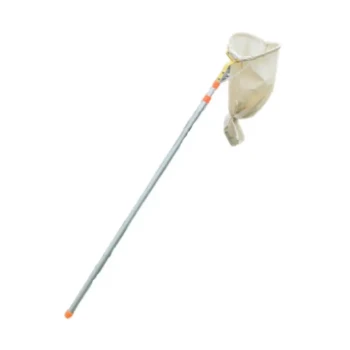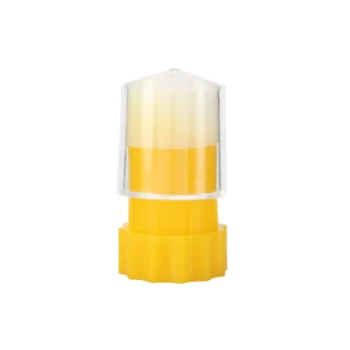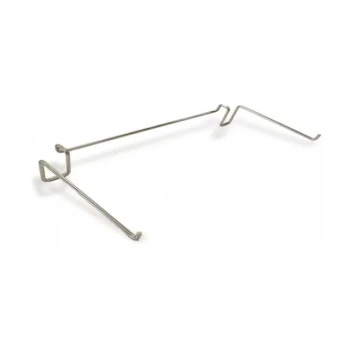In colder climates, winter bees are not just another generation of workers; they are the colony's specialized survival unit. These bees are physiologically distinct from their summer sisters, born with the sole purpose of keeping the queen and the colony alive through the long, resource-scarce winter months. Their existence is the single most critical factor determining whether a hive will survive to see the spring.
The survival of a honey bee colony through a cold winter rests entirely on a distinct, long-lived generation of "winter bees." These bees are built for endurance and heat production, not foraging, and their health and population size are the ultimate measures of a colony's winter-readiness.

The Shift: From Summer Forager to Winter Survivor
To understand the importance of winter bees, you must first understand that they are fundamentally different from the bees you see working during the spring and summer.
What Defines a Winter Bee?
A summer worker bee lives a frantic life of foraging and brood-rearing, lasting only four to six weeks.
In contrast, a winter bee, born in the late autumn, can live for four to six months. This extended lifespan is not an accident; it's a specific physiological adaptation.
Their bodies are optimized for fat storage and endurance, allowing them to survive the long period without incoming nectar and pollen. Their primary jobs are to generate heat and protect the queen.
The Critical Role of the Winter Cluster
The most important behavioral change in winter bees is the formation of the winter cluster. As outside temperatures drop, the bees congregate into a tight ball around the queen.
By vibrating their wing muscles, the bees in the cluster generate heat, maintaining the core temperature at a level that ensures the queen's survival, even in sub-zero conditions.
Bees on the inside of the cluster tend to the queen and consume honey for energy, while bees on the outer layer act as a thick, insulating blanket. The bees continuously rotate positions, ensuring no single group is exposed to the cold for too long.
A Tale of Two Climates: Cold vs. Warm Regions
The concept of a "winter bee" is most pronounced in regions with harsh, extended winters. The environmental pressure dictates the biological strategy.
A Matter of Necessity
In cold climates, a long period with no available forage makes survival the only objective. The colony ceases brood-rearing and dedicates all its energy to thermoregulation.
The winter bee's extreme longevity is a direct adaptation to this reality. The colony must survive for months on a finite population of bees.
Adaptation in Warmer Climates
In warmer regions, like Florida or Texas, the winter is less severe. While bee activity and brood production may decrease, they rarely stop completely.
Bees in these climates may have slightly longer lifespans to bridge shorter gaps in foraging, but they do not undergo the same dramatic physiological transformation. The survival challenge is less absolute, so the biological response is less extreme.
The Beekeeper's Critical Role
A colony cannot produce a strong winter bee population without the right conditions. As a beekeeper, your management practices in late summer and early fall are what set the stage for winter survival.
Triggering Winter Bee Production
Winter bee development is triggered by environmental cues, such as shortening daylight hours and a decline in nectar flow. A healthy, well-mated queen is essential to lay the eggs that will become these vital bees.
Ensuring Critical Resources
The bees that become winter bees require ample nutrition, particularly pollen, during their larval stage to develop the fat bodies necessary for their long life.
Furthermore, the colony as a whole needs a massive store of honey to fuel the winter cluster for months. Your role is to ensure these resources are present, supplementing with feeding if necessary.
The Pitfall of Poor Health
The single greatest threat to winter bee production is the Varroa mite. Mites weaken bees, spread viruses, and shorten their lifespan.
A bee that has been parasitized by mites as a larva will never become a healthy, long-lived winter bee. Aggressive and timely mite management in the late summer is non-negotiable for winter survival.
Making the Right Choice for Your Goal
Your end-of-season strategy should be entirely focused on helping the colony create a large, healthy population of winter bees.
- If your primary focus is survival in a cold climate: Prioritize late-summer Varroa mite control and ensure the hive has ample honey stores before the first frost.
- If your primary focus is maximizing winter bee population: Ensure you have a young, vigorous queen by mid-summer, as she is responsible for laying the eggs that become your winter survivors.
- If you are beekeeping in a warmer climate: Monitor honey stores during cool, non-foraging periods, but understand your bees' winter strategy is one of reduced activity, not a complete biological shift.
Understanding the unique biology of the winter bee is the first and most important step toward successfully guiding your colonies from one season to the next.
Summary Table:
| Key Aspect | Summer Bee | Winter Bee |
|---|---|---|
| Lifespan | 4-6 weeks | 4-6 months |
| Primary Role | Foraging, Brood-Rearing | Heat Generation, Queen Protection |
| Key Adaptation | High metabolism for work | Fat storage for endurance |
| Critical for Beekeeper | Maximize honey production | Ensure Varroa control & food stores |
Ensure Your Apiary's Winter Survival with HONESTBEE
Your late-season management is the deciding factor in your colony's success. A strong population of healthy winter bees requires robust hives and the right equipment.
HONESTBEE supplies commercial apiaries and beekeeping equipment distributors with the high-quality, durable supplies needed to support your colonies through the toughest winters. From essential mite control treatments to efficient feeding systems, our wholesale-focused operations provide the reliable gear that underpins successful wintering strategies.
Don't leave your colony's survival to chance. Let's discuss how our equipment can strengthen your winter-ready hives.
Contact HONESTBEE today for a quote to prepare your apiary for the cold season.
Visual Guide

Related Products
- Professional Insulated Winter Hive Wrap for Beekeeping
- Long Langstroth Style Horizontal Top Bar Hive for Wholesale
- HONESTBEE Round Hive Top Bee Feeder for Syrup
- HONESTBEE Professional Long Handled Hive Tool with Precision Cutting Blade
- Professional Multi-Function Stainless Steel Hive Tool
People Also Ask
- Why is it important to insulate beehives during winter? Boost Your Colony's Survival Rate
- Is it always necessary to insulate beehives? A Guide to Winter Survival & Colony Health
- Why are insulation wraps critical for outdoor honey bee wintering? Maximize Colony Survival & Energy Efficiency
- How do insulation wraps and hive wraps protect bee colonies during winter? Maximize Survival & Honey Reserves
- What key factors should a beekeeper consider before wrapping a beehive? 3 Essentials for Winter Survival



















